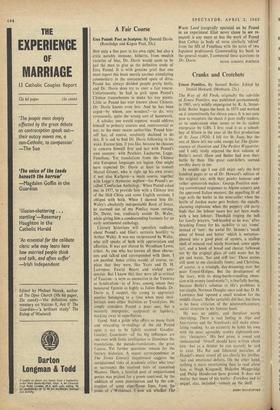ay NICHOLAS DAVENPORT
Budget Advice-2
of both equipment and human attitudes by which alone we can' stop these recurring cycles of balance of payments weaknesses. For this reason we cannot accept—and we do not think that anyone is asking us to accept—that in order to try to secure a temporary improvement in the balance or.. payments we should push deflation to the point at which it would utterly defeat our long-term objectives.'
On this principle the Chancellor would be wise to stand firm and tell the central bankers that,. if they choose to make it so, this is our point of departure. He should not go back on what he said at Cardiff on February 24: 'The Govern- ment's programme is aimed at balancing our overseas payments not this year but within a reasonable period of time. I am sure that the country is united in not wanting to go back to the strait-jacket of the 1961 [deflationary], policies with all the unfairness and hardship that resulted from creating unemployment in the desperate hope that somehow the unemployed would go back and work in the export indus- tries,' Mr. Callaghan spoke the truth..
Today--with our economy suffering grievously from the immobility of labour and unevenly balanced betWeen north and south--it would be absurd to apply a huge global figure of defla- tionary taxation as the economists are demand- ing—some £200 million and sonic £300 million --and expect it to have any useful effect in the promotion of our export trades. The last time a Labour Chancellor tried to wipe out an infla- tionary gap by deflationary taxation his figures. turned out to be 1400/ million wrong. I hope Mr. Callaghan will not indulge in another stupid arithmetical guessing game. I have already warned him against the neurotic over-conser- vatism in budget estimating which is endemic in the Treasury, whose officials love to make the revenue figure too small and the expenditure figure too large. Heaven knows what the infla- tionary gap is today! In his interim budget Mr.. Callaghan put on an additional six- pence on income tax for this coming year (£122 million) and another sixpence on petrol (£93 million) which more than covered the gap of £130 million in the extra pension and national' health insurance bill left after allowing. for the increased contributions. If he wants to raise still more taxation he has a flexible instrument at hand -- namely, the new corporation tax. A 35 per cent rate brings in £1,057 million, which must be added to the 'double taxation' on dividends of over £500 million. An extra 1 per cent on the corporation tax brings in £30 million. If he made the corporation tax 40 per cent he would therefore gather in an extra £150 million. What more does he want?
What is important is that the budget should not stand in the way of our achieving our real objective, which is to raise output and improve the productivity of labour—the only sound way to stop a wage-cost inflation. This means cutting out the restrictive practices of both management and labour, re-equipping factories with the latest labour-saving techniques and, withal, working harder. For that reason I rule out: (1) increasing income tax or surtax, which would merely knock the work incentives of the young managerial class and the highly skilled workers whose






































 Previous page
Previous page